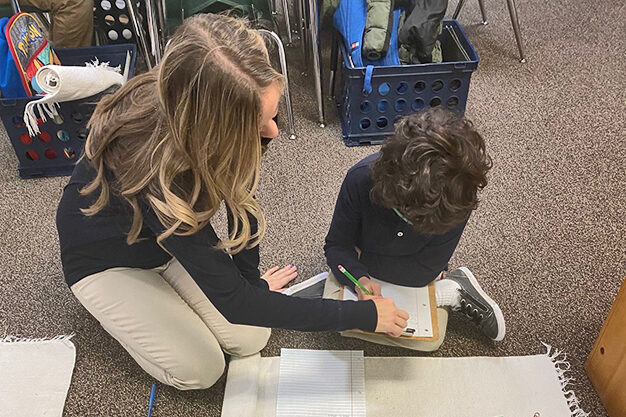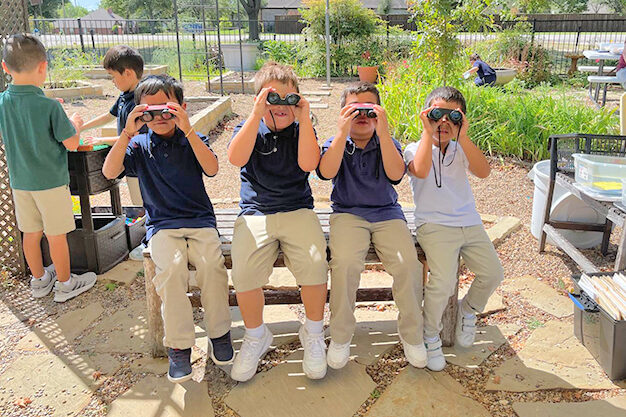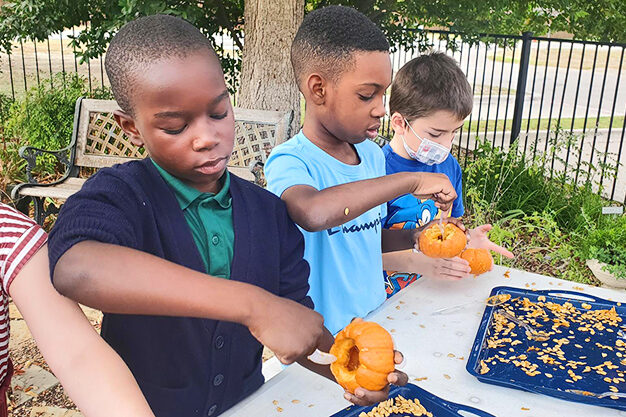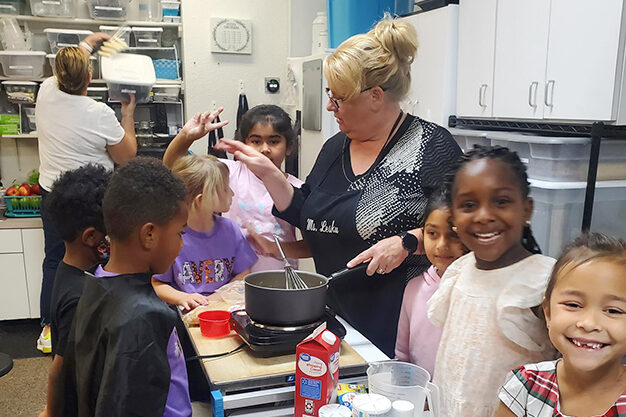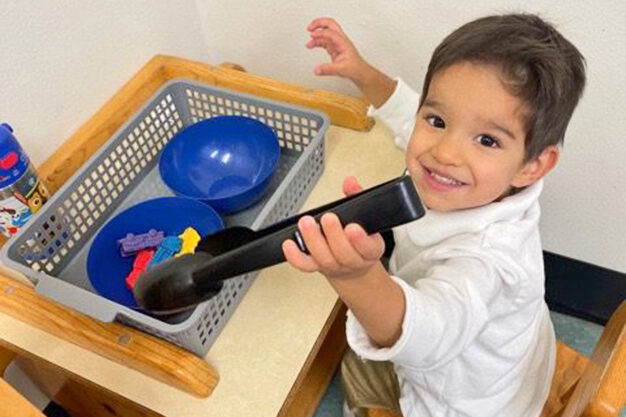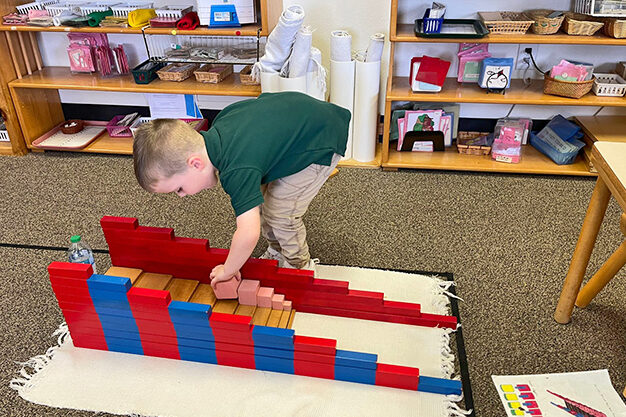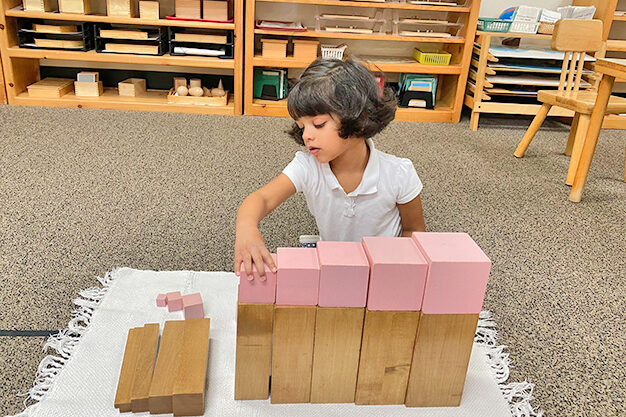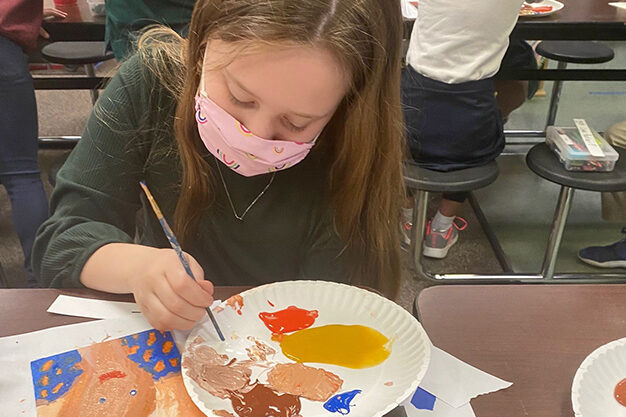Frisco Montessori School’s Elementary and Middle School Programs encourage children to function at the upper limits of their potential. The Montessori materials offer open-ended exploration and avenues for self-expression, which allow children to progress according to individual abilities and skills. Their instruction begins with concrete realities, adding one difficulty at a time, moving sequentially into abstract theory. The development of critical thinking skills occurs naturally in this type of environment.
 Te Language curriculum follows a definite order beginning with concrete materials, gradually moving towards the ultimate goal of abstraction. The Language curriculum is divided into different areas of study: word study, capitalization /punctuation, grammar, dictionary usage, sentence analysis and spelling. In each category, the child is presented lessons in a small group and is then given the opportunity to explore and discover independently.
Te Language curriculum follows a definite order beginning with concrete materials, gradually moving towards the ultimate goal of abstraction. The Language curriculum is divided into different areas of study: word study, capitalization /punctuation, grammar, dictionary usage, sentence analysis and spelling. In each category, the child is presented lessons in a small group and is then given the opportunity to explore and discover independently.
Children are submerged in reading on a daily basis through independent study as well as group settings. The children build their reading skills through a phonetic-based program. Reading comprehension is built through many different avenues of work. Each child is challenged on his/her own level with the lessons presented, as he/she is ready.
8890 Meadow Hill Dr. Frisco, TX 75033 Email: admin@friscomontessori.com Phone: 972.712.7400
 Students also participate in a Reading Comprehension program on a weekly basis. This program introduces children to quality pieces of literature from all genres. The children work with one piece of literature per week. They are led through group-discussion sessions where divergent questions are explored and debated. This helps to build higher-level thinking skills as well as problem solving skills. Throughout the week, the child participates in activities related to the element of focus (setting, plot, character, traits, cause and effect, etc.) for that particular week. The activities vary depending on the selected piece of literature.
Students also participate in a Reading Comprehension program on a weekly basis. This program introduces children to quality pieces of literature from all genres. The children work with one piece of literature per week. They are led through group-discussion sessions where divergent questions are explored and debated. This helps to build higher-level thinking skills as well as problem solving skills. Throughout the week, the child participates in activities related to the element of focus (setting, plot, character, traits, cause and effect, etc.) for that particular week. The activities vary depending on the selected piece of literature.
Writing skills are encouraged through daily journal writing. This time allows the child to write creatively, striking his/her imagination. In addition, numerous writing concepts are explored and practiced through different lessons throughout the year.
Third through eighth level children participate in an additional creative writing course. Instruction centers on the different types of writing, prewriting and planning, and elaboration techniques essential to powerful writing. Small group instruction is followed by independent practice in the classroom.

The Math curriculum follows a sequential order in a number of different areas of study. The children receive lessons in mathematical operations and basic facts of addition, multiplication, subtraction and division, as well as advanced computations using all four operations. The Elementary children also do extensive work with fractions and decimals. The students are shown these concepts in a spatial manner as well as learning how to solve these problems abstractly. Other concepts that are studied thoroughly throughout the year are fractions, advanced fraction work, multi-step problem solving, pre-algebraic equations and concepts, elapsed time, etc. Each concept is first introduced using concrete materials. As the child progresses, he/she gradually works towards abstraction. In addition to mathematical concepts, the child is also presented lessons exploring the different concepts of geometry. The Elementary students focus on geometry concepts such as types of angles, equivalence, using a protractor and compass accurately, formulas for area and volume, and many other challenging topics.
Writing skills are encouraged through daily journal writing. This time allows the child to write creatively, striking his/her imagination. In addition, numerous writing concepts are explored and practiced through different lessons throughout the year.
Third through eighth level children participate in an additional creative writing course. Instruction centers on the different types of writing, prewriting and planning, and elaboration techniques essential to powerful writing. Small group instruction is followed by independent practice in the classroom.

Cultural lessons are presented throughout the year in the areas of Zoology, Botany, Geography and History. Each lesson is aimed to encourage higher-level thinking skills and spark the child’s inner desire to research and discover. In addition, a separate Science program is implemented weekly. The children are introduced to numerous Science concepts in the areas of Physical Science, Life Science, Earth Science, etc. These concepts are explored in a tangible, hands-on approach through different experiments and activities. Each year, our fourth through eighth level students take part in FMS’s Science Fair.
